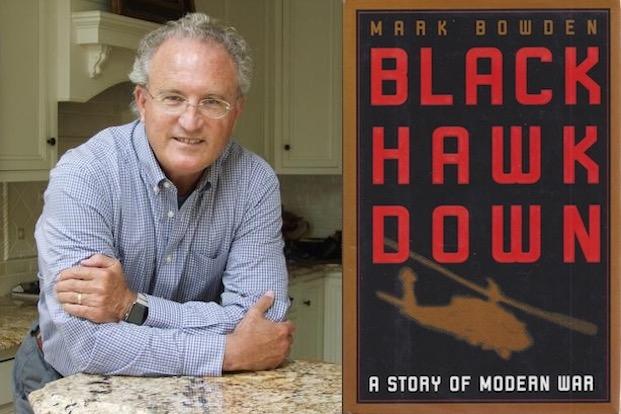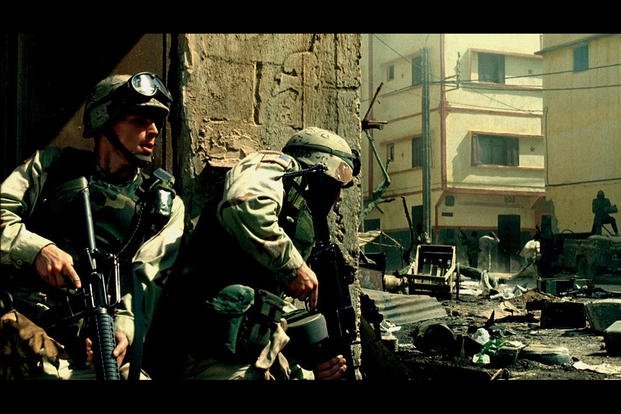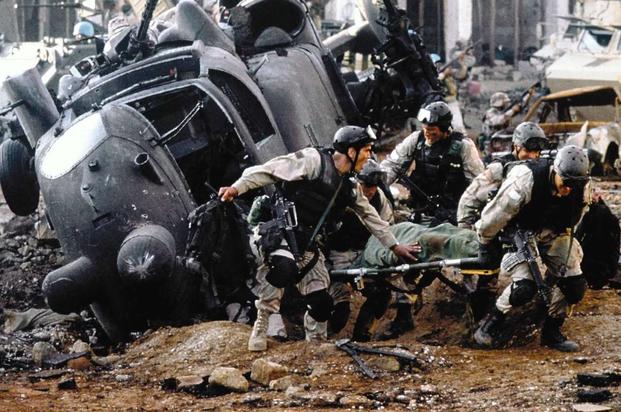"Black Hawk Down," the classic combat movie about the 1993 battle in Mogadishu, Somalia, has just been restored for a spectacular new 4K UHD home video release. Eric Bana, who plays Sgt. 1st Class Norm "Hoot" Gibson in the movie, joined us for a conversation about the film's lasting legacy.
Director Ridley Scott's "Black Hawk Down" got a limited release at the tail end of 2001 and went into nationwide release in early 2002. That makes it the first great war movie released after 9/11 and the last great war movie filmed before the attacks.
The movie won Oscars for Best Editing and Best Sound Mixing. It was also the most recent of Scott's three Best Director nominations after "Thelma & Louise" and "Gladiator." It's hard to believe that Ridley's never won an Academy Award. There was also a nomination for Sławomir Idziak's cinematography.

In 1993, U.S. troops participated in a U.N. task force that aimed to restore order in Mogadishu and remove a government that was killing its own citizens. What was intended as a simple raid and capture of warlord Mohamed Farrah Aidid went wrong when Somali fighters shot down two UH-60 Black Hawk helicopters and the extraction became a rescue mission.
Over the course of the battle, 18 American soldiers were killed and 73 were wounded. Images of American bodies dragged behind pickup trucks dominated CNN (we only had CNN then) and provided a stark contrast to what civilians perceived as the cakewalk of the first Gulf War.

Journalist Mark Bowden set out to tell the story of the mission, and his book became the source material for "Black Hawk Down."
This 4K release is on par with the outstanding upgrades done for Ridley Scott's other movies "Alien," "Blade Runner" and "Gladiator." If you've invested in a 4K UHD TV, these titles make a strong case for getting a 4K disc player to take full advantage of the technology. If I ran a home theater store, this would be the disk I'd use when trying to sell you one of those $10,000 TV sets.
As with so many Ridley Scott movies, there's an Extended Cut of the movie that's eight minutes longer than the theatrical cut. Unlike a lot of those other recuts, this one doesn't change much about the movie. It's exclusively on the 4K disc. The release is also loaded with bonus content, and there's a complete list of the extras at the bottom of this post.
The movie features a great cast, a showcase for the next generation of actors. Sam Shepard, Tom Sizemore and Ewan McGregor were already well-known, but Josh Hartnett, Tom Hardy, Orlando Bloom, Ioan Gruffudd, Hugh Dancy, Ty Burrell, Nikolaj Coster-Waldau and Eric Bana had their first high-profile roles in this film.
Eric Bana's performance as Hoot in "Black Hawk Down" led to the lead as Bruce Banner in Ang Lee's "Hulk." He's had a long and successful career since, highlighted by roles in "Lone Survivor," "Munich," "Star Trek," "The Finest Hours" and, most recently, the acclaimed TV series "Dirty John."
We talked about the making of "Black Hawk Down," why it resonates with veterans and how he contributed to the movie's most famous lines.
When did you first realize how important "Black Hawk Down" is to people in the military community?
I think it really dawned on me at the premiere, seeing the reaction from members of the military afterward. That was probably the first time it landed.
Then most definitely when I started to travel internationally, and I would get randomly approached at an airport or by customs officials on a pretty regular basis. And I suddenly realized that, well, maybe we did do a slightly different job on this film and maybe it's landed in a particular way.
Do you have any memories of the experience of making the film, how you were cast, how everyone came together?
The whole experience was really quite incredible. We had the most amazing cast, which only in the passage of time can people look back at that cast list and have their mind blown as to how many incredible actors were brought together.
Most of us were at the very beginning or close to the beginning of our careers. Obviously, some actors were well and truly on their way but, for a lot of us, it was our introduction to a lot of audience members.
It had a really exciting, fresh, adrenaline-filled, adventurous vibe. We were sort of in mini groups, like myself and Bill Fichtner and Kim Coates were off doing some Delta stuff. We were separate from the guys who were playing Rangers, so it wasn't until we really started shooting that we all started mixing together.
Even then, because the cast was so big, there [were] little enclaves of four and five, as you would have in normal life, groupings of people hanging out and eating together and whatever.
The shoot was insane and fun. It was long, and I think the location really added to the intensity of the experience. The chaos around the shooting schedule and the fragmented way that we put the film together added to it as well. We all found ourselves on the streets of Rabat, Morocco, running around making noises.
You're also in "Lone Survivor." There seems to have been a real change in the culture of how military movies were made in recent years. "Lone Survivor" director Peter Berg loves having military consultants on set who've actually had the experiences.
With "Black Hawk Down," did you have people on set who [had] lived through the actual battle? Did you have military advisers that you worked with back at the turn of the century or was it a different experience from making Lone Survivor, if that makes sense?
No, it was kind of similar. No, we had a lot of military people working with us. I worked really closely with [retired Army Col.] Lee Van Arsdale. [Former Navy SEAL] Harry Humphries was on the shoot, and obviously we had a lot of active airborne who were flying the birds and so forth.
Did you met people who lived through the battle at the time or have you met them since the film came out?
[Retired Army 1st Sgt.] Matt Eversmann came to visit us on set in Morocco.

You got your start in comedy and then been in all these action and military movies, like "Black Hawk Down," "Munich," "The Finest Hours" and "Lone Survivor." Did you anticipate this or did it just sort of happen to you?
I think if I had come up with this plan, I would have failed miserably. So it was definitely a case of improvising every step of the way.
Let me ask you, what is it about the film that means so much to people? Is it the point of view or is it the way that it was technically shot that is of use to people who have a military background? What is the point of difference about this film that makes guys love it so much?

Part of it is a mystery to me. You were in "Munich," another great film that has a lot of attention to detail and has a great sense of the process of Israeli intelligence agents work. But, for whatever reason, it doesn't quite resonate like "Black Hawk Down."
"Black Hawk Down" is just a brutally efficient action movie as well. As hard as parts of it are to watch, it's exciting to watch it every single time. But it's not about a military situation that would've garnered much attention if things hadn't gone wrong. It's not a mission that's part of an action that a lot of veterans were part of.
I think a big part of it is that "Black Hawk Down" came out as a new generation was fighting in Afghanistan and preparing to go to war in Iraq. It's the first movie that spoke to their generation about the experience of battle.
As with everything in movies, it's just all timing and quality and magic come together at the same time to make something like this happen.
A lot of us are very, very close friends still in groupings. And one of the things that we talk about a lot is how lucky we are with the timing because it was right before September 11th that we wrapped the film. There really was a sense that it just would not have been possible to make that film 12 months later in the way that we did.
The message that we used, the hardware that we used, politically, physically, even just down to what we were allowed to do with actors. After 9/11, there's no way someone is gonna allow me to sit on the outside of a Little Bird with just a carabiner around my belt loop. It just wasn't going to happen any other time and place ever than that year in Morocco. And that was happening every second or third day. There were just so many things that occurred at that time that can't be replicated.
Something else comes to mind as to why the movie resonates for viewers. That's the speech you give to Josh Hartnett at the end of the movie. That's probably on the short list of great military movie speeches.
Well, you know the line was originally different, right? The line was written as, "People ask me why I do it, I tell 'em it's about duty, honor, and love of country." We filmed it at a point in the shoot where I felt like I had gotten to know all our military advisers really well and fortunately [screenwriter] Ken Nolan was on set.
And I said to Ridley, "I don't believe this. I don't believe this line, I don't believe this is what someone like him would say at this point in time." And he says, "Well, why?" And I said, "I just think it's about each other. It's about that." And he said, "All right, mate, well, f**king try it out."
So that actually just came out of an observation that I didn't believe, and Ken felt the same way. You know it's like, "Ken, do you mind if I try this?" He's like, "No, absolutely, that makes sense to me too." I was thrilled when it ended up that way in the film because that's what felt like the truth at the time.
It's one of those things as an actor where you know you get a piece of dialogue at one stage and it makes sense, and then you get there on the day and you go, "This doesn't make any sense. I don't believe this, and it feels wrong to say this." You know, "This feels like the movie version of the movie; this doesn't feel like the real version of the movie. The other one is what feels real."
I have Ridley to thank because a lot of directors would say, "No, mate, just say it as written. I don't want to get my ass kicked." And hats off to Jerry [Bruckheimer, the producer] as well because I'm sure it was a line that would have made sense to everyone at the time when the script came out, and he allowed the line to be changed in the final cut. So yeah, I'm really glad that happened.

Maybe you take get some credit for the line as well, because I really do think that's a big part of what ties the movie together.
I can't take any other credit for any of the dialogue, other than it's just that tiny point of view. Ken did really an amazing job of adapting Mark [Bowden]'s book.
The two biggest gifts for all of us as actors were, A, the opportunity to do the film, and then, B, the hugely unusual very, very, very close friendships that exist amongst everyone still to this day. I just had a cup of coffee with Ken Nolan this morning just because I'm in LA.
Three-quarters of my closest friends are from the shoot, and everyone is the same. Every little enclave has their own little two or three grouping of really, really close friendships. That's definitely not normal. We're all really grateful, and I think the film and the subject matter had a lot to do with that.
I always consider "Black Hawk Down" and "Dazed and Confused" as the most clairvoyant casting jobs of all time. Almost no one in the cast is famous yet, and just about everybody went on to be incredibly successful.
Even now, when the film comes up and I watch, I just am mind-blown because you'll come across some other actor who has since, even the last two or three years, broken through again. You go, "Well, there's another one." It's just crazy.
I don't think when Orlando Bloom was cast, that anyone had any idea that he was about to blow up from "Lord of the Rings." The fact that he dies so early seems like a shock with a guy who was so famous.
Exactly, exactly.

Ridley Scott has been on this 45-year tear of making consistently interesting and usually great movies. You've worked with a lot of amazing directors like Ang Lee, Steven Spielberg, Peter Berg, J.J. Abrams, Jim Sheridan and Guy Ritchie. What was the experience like working with Ridley?
He was wonderful, just really accommodating and patient and really took pride in explaining things if he had the time to. There was a little twinkle in his eye at the time. I think he enjoyed showing a lot of us young guys the way. I remember him saying in pre-production, "I've already made the movie in my head, now I just have to go and shoot it."
Were there charted-out storyboards or was he just telling you what to do because he sees it in his head already?
No, he was describing it, and then sometimes he would do little cartoon sketches and show different people things that he wanted, whether it was the first assistant director or a stunt guy or a pilot or something. He would just do a little drawing. You just wanted to steal them because they were little Ridley Scott drawings. He was very visual in the way he would explain things. It was amazing.
-----

Here's the full list of bonus material included on the Blu-ray discs that come with this release:
Included on Blu-ray movie disk
- Audio Commentary by Director/Producer Ridley Scott & Producer Jerry Bruckheimer
- Audio Commentary by Author Mark Bowden & Screenwriter Ken Nolan
- Audio Commentary by Task Force Ranger Veterans
- "The Essence of Combat: Making Black Hawk Down" Documentary (included on Blu-ray movie disk)
Included on Blu-ray bonus disk
- The History Channel® Presents: "The True Story of Black Hawk Down"
- PBS Presents: "Frontline: Ambush in Mogadishu"
- 8 Deleted & Alternate Scenes with Optional Commentary
- "Designing Mogadishu" Featurette
- Production Design Archive
- Storyboards with Optional Commentary
- Ridleygrams with Optional Commentary
- Target Building Insertion: Multi-Angle Sequence with Optional Commentary
- Q&A Forums: BAFTA. Motion Picture Editors Guild & American Cinematheque
- Jerry Bruckheimer's BHD Photo Album
- Title Design Explorations with Optional Commentary
- "Gortoz A Ran -- J'Attends" Music Video performed by Denez Prigent & Lisa Gerrard
- Photo Galleries
- Theatrical Poster Concepts















